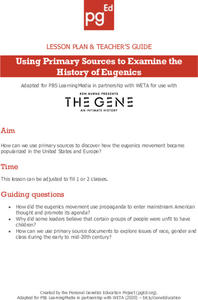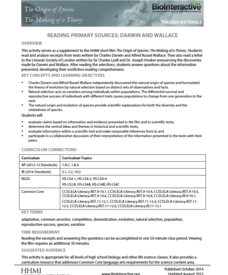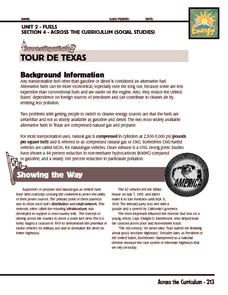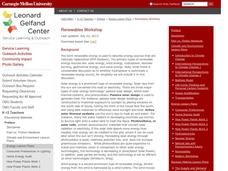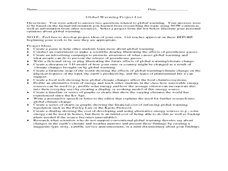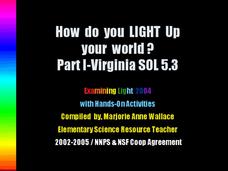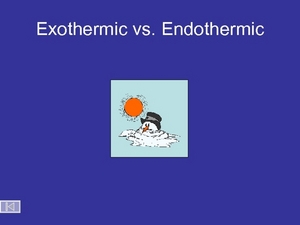Curated OER
Death and Dying in Puritan New England: A Study Based on Early Gravestones, Vital Records, and other Primary Sources Relating to Cape Cod, Massachusetts
Students examine the time in which the Puritans lived in colonial New England. In groups, they research the Puritans view on life and death and discuss as a class. They read gravestones, diaries and other primary sources to discover...
Personal Genetics Education Project
Using Primary Sources to Examine the History of Eugenics
Eugenics philosophy takes survival of the fittest to a whole new level. With a research-focused lesson, young scientists examine the history of the eugenics movement and its impact on society. Pupils engage with a video clip, primary...
Tennessee Valley Authority
Renewable Energy Sources
Not all energy sources are renewable, as learners investigate in this unit. Made up of six lessons that span a few weeks of instruction, the unit has learners examining US energy reserves and consumption, using data to draw conclusions...
Wind Wise Education
Understanding Forms and Sources of Energy
What is the difference between a form of energy and a source of energy? This first activity in a series of 19 lessons uses demonstrations and discussions to introduce energy to the class. Through using hand-generator flashlights,...
DocsTeach
Environmental Case Study: Hetch Hetchy Valley
What is more important: building a new school or preserving a nature reserve? Keeping a natural area clean or providing clean drinking water to a city of millions? Young scholars weigh these questions—almost literally—using an...
Howard Hughes Medical Institute
Reading Primary Sources: Darwin and Wallace
Take your classes back in time. Learners read real historical texts from both Darwin and Wallace as well as an announcement of their findings. Using guiding questions, they make inferences and draw conclusions from the information in the...
Curated OER
The Wrights' Flight: History Through Primary Sources
Students read primary source material about the Wrights' first flight such as a journal and a telegram. In this The Wrights' Flight lesson, students select the most reliable primary source and compare the pros and cons of using primary...
Texas State Energy Conservation Office
Investigation: Tour de Texas
Teams of Texas tourists gather into groups to analyze what they can do with $50 worth of an alternative fuel. They write checks, keep a balance sheet, and map out their sight-seeing route taking into consideration the location of...
Curated OER
Primary Energy Sources Pros and Cons
Students explore the different types of renewable and nonrenewable energy sources. In this earth science instructional activity, students discuss the pros and cons of each type. They conduct a variety of experiments on renewable energy.
Carnegie Mellon University
Renewables Workshop
Youngsters examine resource maps to find out which states are using solar and wind power and discuss as a class various other renewable energy sources. They use a provided data table to record pros and cons to each technology, build and...
Curated OER
Hugh Miller's The Old Red Sandstone (1841)
Pollution has been an issue since the advent of stratified society. Learners will read this excerpt from Hugh Miller's The Old Red Sandstone (1841) then answer two document-analysis questions.
Curated OER
The Chesapeake Bay in Captain John Smith's Time
When Captain John Smith visited the Chesapeake Bay in the summer of 1608, what types of animals and habitats did he encounter? Your young historians will analyze primary source documents to answer this question, as well as compare...
K20 Learn
Bavaria Has Issues...Experimental Components
Do you want to be a detective by analyzing situations? An engaging lesson provides young historians with the tools to help them understand the difference between data types and how to analyze them to draw conclusions. Scholars complete...
EngageNY
TASC Transition Curriculum: Workshop 12
How can opinions slant facts? Workshop participants learn how to examine primary and secondary sources and identify the author's point of view. They also examine how visual art impacts the meaning and rhetoric of sources. Full of...
Curated OER
Lesson Plan: Global Warming
Students explore the concept of global warming. In this climate change lesson plan, students explore the provided links to PBS NOW sources and research the greenhouse effect and the effects of global warming. Students support their...
Curated OER
How Do You Light Up Your World?
A fabulous presentation on light is here for you. In it, learners view slides which cover many important concepts of light. They understand exactly what light is, what the main sources of light are, what opaque, transparent, and...
Cold Spring Harbor Laboratory
Mutations Are Changes in Genetic Information
A red delicious apple tree with a simple mutation means we now benefit from the existence of golden delicious apples. Learn how simple mutations change genetic information in DNA sequences. Using biographies, videos, and animations,...
Society of Petroleum Engineers
Renewable and Nonrenewable Energy
Energize an environmental science unit on natural resources with this collection of instructional materials. From simple coloring sheets for primary grade children, to guiding questions for a high school research...
Curated OER
Fracking: Positive or Negative Impact?
Your teenagers may have heard of fracking, but do they really know what it is? And could they debate the benefits and risks? Educate your environmental science class with a lesson about hydraulic fracturing, non-renewable energy...
Curated OER
Primary/Elementary Activity: Active Energy Sources
In this active energy source worksheet, students act out the energy source words in a game. Students complete 12 different actions for the 12 different energy sources.
National Endowment for the Humanities
Albert Sabin and Bioethics: Testing at the Chillicothe Federal Reformatory
Do the ends justify the means? Getting a drug approved in the US is a long and involved process. But at some point out, it involves testing on humans. The ethics of such testing is the focus of a resource that uses Dr. Albert...
Government of South Australia
Don't Waste Your Energy
Don't lift another finger, this physical and environmental science unit has everything you need to begin teaching your class about energy. Starting with a look at the greenhouse effect, these lessons and activities take young scientists...
American Chemical Society
Preparation and Combustion of Biodiesel
The United States is the world's largest producer of biofuel. During an in-class investigation, young scientists produce their own biodiesel. They burn a sample of it to determine the heat of combustion. Then they discuss the...
Curated OER
Exothermic vs. Endothermic
The PowerPoint opens with video footage of the decomposition of nitrogen triiodide and then explains it with diagrams. Graphs of exothermic and endothermic reactions are exhibited, as well as one for the effect of a catalyst on reaction...
Other popular searches
- Primary Source Documents
- Using Primary Sources
- Primary Source Analysis
- Wwi, Primary Sources
- Rosa Parks Primary Documents
- Gilded Age Primary Sources
- Working With Primary Sources
- Primary Resources Hsie
- Web Quests Primary Sources
- Ancient Rome Primary Sources
- 1920 1929 Primary Sources
- Primary Sources and Family

